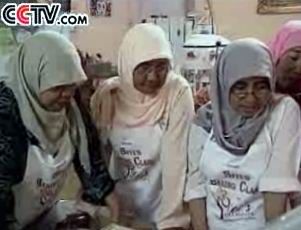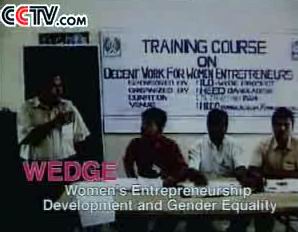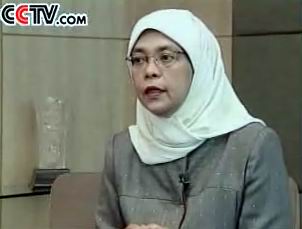Source: CCTV.com
01-15-2007 18:23
During the past decade, Singapore has lost its position as one of the world's leading economies. This has forced the country to restructure its economy in order to create another boom. One solution is to help its women become financially independent. Siti Rohanah Koid from News Singapore gives us the story.
By restructuring the economy, many Chinese workers lost their jobs. Tomorrow, my colleague Zou Yue will bring us the next Labor series--"Challenge for New Life".
 |
Modern, cosmopolitan and progressive – this sums up for many, what the tiny island of Singapore is. From its humble beginnings as a small fishing village, it banked on entrepot trade, and opened up to trade and talent from all over the world. In a mere 3 decades, Singapore grew from a third-world country to a 1st world economy. But in the past decade, like others around the world, Singapore has been forced to restructure its economy, with the advent of the new knowledge economy and globalization.
To stem the tide, job creation and job redesign became a top agenda for the government, and new industries are being shaped, namely the health sector, tourism financial services and biotechnology.
But lately, there is a push for entrepreneurship as a viable alternative to employment – for starters, businesses from home. For workers coping with sudden retrenchment, the idea is attractive, especially for low-skilled women workers, who find the flexibility of running home-based businesses an added bonus.
 |
This group of women is one of several seen daily in Singapore learning a new skill -which they hope can be used to start a small home-based business. The difference is, they are sent to this baking school by their current employer – a government body – which will be retrenching them soon, with benefits of course.
Helen Tham, 55 years old, said "When I hear that I’m getting retrenched, we feel that we have no more hope, you know. Where should we go? Because we are ageing already, right? So later our office arranged some courses for us. If really I have an opportunity, maybe I will start a small, small business."
 |
These efforts in Singapore to encourage women to be active participants in the mainstream economy mirror those by the ILO in countries where women workers are marginalized in the workforce. In rural areas in Bangladesh, Mexico and the Philippines, home-based businesses are promoted as a way out of poverty.
Through programmes such as WEDE and WEDGE, women who are illiterate are equipped with skills and empowered to be self-reliant through entrepreneurship.
 |
| Halimah Yacob |
Halimah Yacob, member of Parliament, SingaporeAssistant Secretary-General, National Trades Union CongressDeputy Member of ILO Governing BodyRepresenting Workers' Group, said "ILO adopt a multi-faceted approach depending on the circumstances of each country what is useful for us, is perhaps their approach, in terms of helping women access to micro-credit, plus at the same time, providing the resource support, in terms of expertise, professionals. They can share with us some of the experiences they have dealing with other countries, I think that will be useful for us."
These are uncertain times. But perhaps Singaporeans can draw comfort from the emergence of new economic giants China and India right in its own backyard, which many are hoping will propel Singapore, into the crest of another economic boom.
As Singapore stands to gain, so will the women in its workforce. The question is: can its women remain relevant, as they manage their multiple roles and responsibilities at work and at home? The answer, as many have shown, is a resounding yes!
Editor:Du Xiaodan
